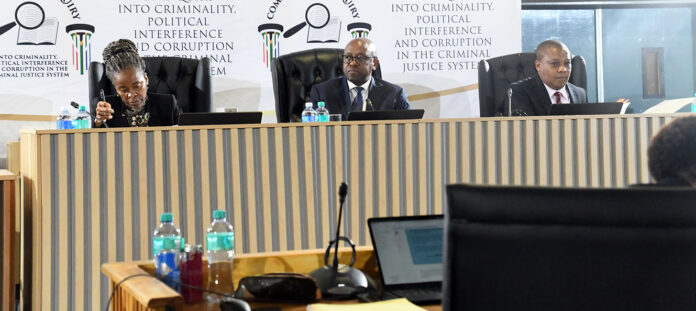The evidence leaders of the Judicial Commission of Inquiry into criminality, political interference and corruption in the criminal justice system have made an application for the hearing of witness testimony from October 13 to October 22 to be heard in a closed session.
The commission’s evidence leaders said the witnesses scheduled for the period should testify in a closed session because they will be exposed to a serious threat of harm if their identities are publicly disclosed.
This was revealed in the evidence leaders’ application for an in camera hearing that was submitted to the commission on Friday.
Media houses News24 and Daily Maverick are challenging the evidence leaders’ application for in-camera hearings.
Need to protect witnesses
“In view of the sensitive nature of the evidence to be presented and the imperative to protect witnesses and safeguard the integrity of the proceedings, the evidence leaders submit that it is necessary and appropriate that the hearings for the period 13 October to 17 October 2025 be conducted in camera and that the hearings on 20-22 October be anonymised.
“For the anonymous evidence, the witnesses will testify remotely and with only an audio feed,” read the evidence leaders’ application.
The application stated there are four principal reasons for the request to have in-camera hearings. The four reasons are safety of witnesses, protection of ongoing criminal investigations, protection of investigative methods and operational security, and protection of informants and confidential sources.
“The personal safety of certain witnesses who will appear before the commission will be seriously endangered if their identities are made public. Exposure could lead to intimidation, retaliation, or physical harm.
“This risk is real and documented. Lieutenant-General Mkhwanazi, in his evidence to the
commission detailed the threats faced by officers investigating the Vereeniging murder.
“A threat and risk assessment conducted by a colonel in crime intelligence found that the investigators were at high risk. Of the five detectives assigned to that case, two withdrew out of fear after receiving threats.
“One has since been replaced with another officer whose identity is not yet publicly known, and the remaining two were placed under witness protection, where they remain to this day. Other witnesses before this commission who implicate cartel members or who disclose
their identities as police officers with a central role in the investigation of the cartel
face comparable threats, but many lack formal protection,” read the application.
“Their cooperation depends on the assurance that their identities and testimony will not be publicly exposed,” read the application.
“As the commissioners are aware, the subject matter of the commission’s investigations concerns individuals and entities involved in criminal syndicates. Several of the forthcoming witnesses will testify about the operations of these syndicates and their connections within law enforcement agencies.
“Portions of their evidence directly concern ongoing criminal investigations. If such
information were disclosed publicly in real time, it could alert suspects, facilitate the
destruction of evidence, or otherwise compromise the work of law enforcement
authorities,” read the application.
“Third, and related to the above, is that certain evidence will necessarily refer to internal
operational strategies and methods of the South African Police Service (SAPS). Disclosure of investigative techniques—such as intelligence-gathering, surveillance methods, or analytical tools—would risk revealing how SAPS detects and disrupts criminal activity.
“Revealing these techniques would equip criminal networks with the knowledge needed
to evade law-enforcement scrutiny. A closed hearing is therefore warranted to preserve the confidentiality of policing methods and to protect the integrity of both ongoing and future investigations,” read the application.
“Fourth, some of the evidence relies on information received provided by confidential
informants and sources whose identities must remain secret. Disclosure of this information could endanger their lives and severely undermine the ability of investigators to obtain information in future.
“Informants and whistle-blowers provide critical assistance to law enforcement on the
assurance of anonymity. Breaching that assurance would not only expose them to
harm but would also have a chilling effect on others who might otherwise approach
the SAPS with information about organised crime, or come to the Commission with
information that is relevant to its Terms of Reference,” read the application.
“For these reasons, the evidence leaders submit that it is in the interests of justice, the
safety of witnesses and the integrity of the Commission’s work that the hearing of
evidence of witnesses scheduled for 13 October to 22 October 2025 take place in
a closed session…
“The evidence leaders therefore respectfully request that the chairperson make an order
in terms of Rule 4.2 directing that the hearings for 13-17 October 2025 be conducted
in closed session and those for 20-22 October 2025 in partially closed session (voice
only), and that the identities of the relevant witnesses be protected under Rule 4.3,” read the application.
The commission’s spokesperson, Jeremy Michaels, said News24 and Daily Maverick have until 2pm on Monday to file a response to the evidence leaders’ application.
Michaels said the evidence leaders will file their response by 5pm on Monday.
He said both parties will file heads of argument by 9pm on Monday.
The commission, which is taking place at the Brigitte Mabandla Justice College in Pretoria, is chaired by retired Constitutional Court Justice Mbuyiseli Madlanga.
Michaels said Madlanga and his co-commissioners, Adv Sesi Baloyi SC and Adv Sandile Khumalo SC, will then consider the application.
He said the commission will resume on Tuesday at 9:30am.
Earlier on Monday, the commission adjourned its proceedings for the day after Madlanga informed the commission’s chief evidence leader Adv Matthew Chaskalson SC and the lawyer for News24 and Daily Maverick, Charl du Plessis, that they should file their written arguments.
Madlanga said he will communicate the commission’s decision in writing.



